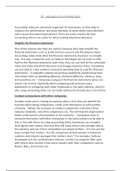D2 - adequacy of accounting ratios
Accounting ratios are extremely important for businesses, as they help to
measure the performance, and draw attention to what needs more attention
and in areas that need improvement. There are many reasons for why
accounting rations are useful for when making important decisions:
Simplify the financial statements
One of the reasons why they are useful is because they help simplify the
financial statements such as profit and loss account and the balance sheet.
Accounting ratios show what the financial statements show but in a simpler
way. This way, companies such as Cadbury Schweppes do not have to refer
back to the financial statements each time, they can just look at the calculated
ratios and make important decisions and changes based on those. Companies
can just look at a few numbers instead of spending time to read the financial
statements. ‘’It simplifies complex accounting statements and financial data
into simple ratios of operating efficiency, financial efficiency, solvency, long-
term positions etc.’’ Companies using just the financial statements alone can
waste a lot of time, especially when comparing with previous years’
statements or comparing with other companies in the same industry, which is
why using accounting ratios can be really useful and can help save a lot of time.
Conduct comparisons with other companies
Another major point in doing accounting ratios is that they can benefit the
business when doing comparisons, either with themselves or with another
company. ‘’Allows the company to conduct comparisons with other firms,
industry standards, intra-firm comparisons etc. This will help the organization
better understand its fiscal position in the economy.’’ Companies have to
compare themselves with other companies in the same industry to be able to
stay in line with them, by using accounting ratios, businesses can compare
their figures with others, that way they will know what is the average ratio in
the industry, and see if their competitors are ahead of them. ‘’it is not just the
base number that matters. It is the comparison of that number to historical
numbers and industry averages that matters most.’’ For example, Cadbury
Schweppes is in the confectionery industry, so they can compare their ratio
with others who are also in the same industry with their competitors such as
Nestle, Mars, and Ferrero etc.





